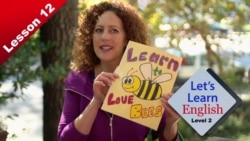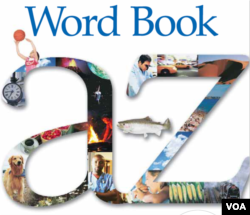Tóm lược (Summary)
Anna is afraid of bees. Her friend Kaveh tells her to talk with Caroline, a beekeeper and bee educator. Will Anna fight her fear and learn to love bees?
Anna rất sợ ong. Bạn cô là Kaveh bảo cô đi nói chuyện với Caroline, một người nuôi ong kiêm nhà giáo dục về ong. Liệu Anna có dám vượt qua bản thân và học cách yêu ong được không nhỉ?
Hội thoại (Conversation)
(blue text shows conditional sentences)
Anna: Wow. Did you know that bees are dying?
Kaveh: That is bad news. If all the bees died, there would be no food. Bees are very important.
(buzz sound)
Anna: Yes, they are. Speaking of bees, one of our little friends is here now.
Kaveh: You know, Anna, if you ignore it, it will fly away. But if you swat it, it might sting you.
Anna: I’ll ignore it. I can ignore it. See, I’m ignoring it. (she is swatting at the bee)
Kaveh: Anna, are you afraid of bees?
Anna: What makes you say that?
Kaveh: Anna, you should call my friend, Caroline. She is a beekeeper and a bee educator. If you talk to her, she’ll probably help you get over your fear of bees.
Anna: I am not afraid of bees.
Kaveh: Here’s her card.
Anna: Ahhh!
Prof. Bot: In this lesson, you can learn about conditionals. They have "if" and "will" or "would." There are two kinds of conditional sentences in this lesson.
Type 1 conditionals have a real event, and a result that probably will happen. Chances are good. Here is the pattern:
If +present tense verb ... will + future tense verb.
Kaveh uses this when he says: "If you ignore it, it will fly away."
Type 2 conditionals have a possible event and a result that may or may not happen. We don't know. Here is the pattern:
If + past tense verb ...would + infinitive verb.
Kaveh uses this pattern when he says, "If all the bees died, there would be no food."
Look for the "if" in a sentence to find more conditionals in today's lesson. I'll color them, too!
Anna: I think I'm at the wrong address. This does not look like a place where bees are kept. (knocks on door)
Anna: Oh, sorry to bother you. I’m looking for beekeeper Caroline. I’m here to take her “Learn to Love Bees!” class.
Caroline: You’re in the right place! I’m Caroline!
Anna: Oh, nice to meet you! Um, Caroline, I thought this class used real bees and real hives.
Caroline: It does! If you look in my backyard, you will see my bees! I’m a home beekeeper!
Anna: What? You live with bees? That is really amazing! And at the same time really scary.
Caroline: It’s not scary. If you come, I’ll show you.
Anna: Caroline, how many bees are in that hive?
Caroline: About thirty thousand (30,000) in each.
Anna: What? That's amazing! But, aren’t you afraid that they are gonna come out and kill you?
Caroline: No, not at all, Anna. Even my children help me. Tell me, why are you afraid of bees?
Anna: I don't know. Well, when I was a little girl my mom ran out of honey. And I really wanted honey for my pancakes. So, I climbed high into a tree and hit a beehive with a stick … several times. Then I reached inside with my bare hands to pull the honey out. That’s when I got stung … a lot.
Anna: Caroline, if you hit a beehive with a stick and reach inside, you might get stung.
Caroline: No, Anna. If you do those things, you will get stung.
Anna: Yes. I did.
Caroline: And you know that it was your fault you got stung, don’t you?
Anna: Yes. I did.
Caroline: Bees know your feelings. And if you stay calm, the bees will be calm. If you're nervous, the bees will be nervous. And if bees are nervous, they may sting. So, please be calm.
Anna: I will be calm. I am calm. Okay, I'm ready. I'm ready
Caroline: Great. Let’s get our equipment on.
Anna: Wait! Wait! I’m not ready! I'm nervous! Give me a minute to be calm.
Prof. Bot: Are you ready for one more conditional sentence?
If you are not afraid, you will join us next time to learn more about bees!
Từ ngữ mới (New Words)
Sách lược học tập (Learning Strategy)
The learning strategy for this lesson is Sequence. That means to look for the order of events in what you are learning. For example, we use a sequence when we write about a process, like how to make a pizza: "first, you mix the dough, next, you make the sauce..."
In this lesson, Anna thinks about the sequence of her experience with a beehive as a child. First, she hit the hive with a stick. Next, the bees came out and stung her. They were angry. Thinking about that sequence will make Anna more careful about hitting a beehive with a stick in the future! Caroline agrees: "If you do those things, you will get stung."
How about you? How do you sequence when you are learning English? Do you start with easier patterns and move on to the harder ones? Write to us in the Comments section or send us an email.
Bài kiểm tra Nghe (Listening Quiz)
See how well you understand this lesson by taking a listening quiz. Play each short video, then choose the best answer.
Tài liệu miễn phí (Free Materials)
Download the VOA Learning English Word Book for a dictionary of the words we use on this website.
Phần dành cho giáo viên (For Teachers)
Send us an email if you have comments on this course or questions.
Grammar focus: Conditional: Present Real (If _____ Will); Present Unreal (If _____ Would)
Topics: Asking for Information; Indicating Uncertainty; Asking for and Giving Reasons; Making Deductions
Learning Strategy: Sequence
Bình luận (Comments)
Now it's your turn. Send us an email or write to us on our Facebook page to let us know what you think of this lesson.







